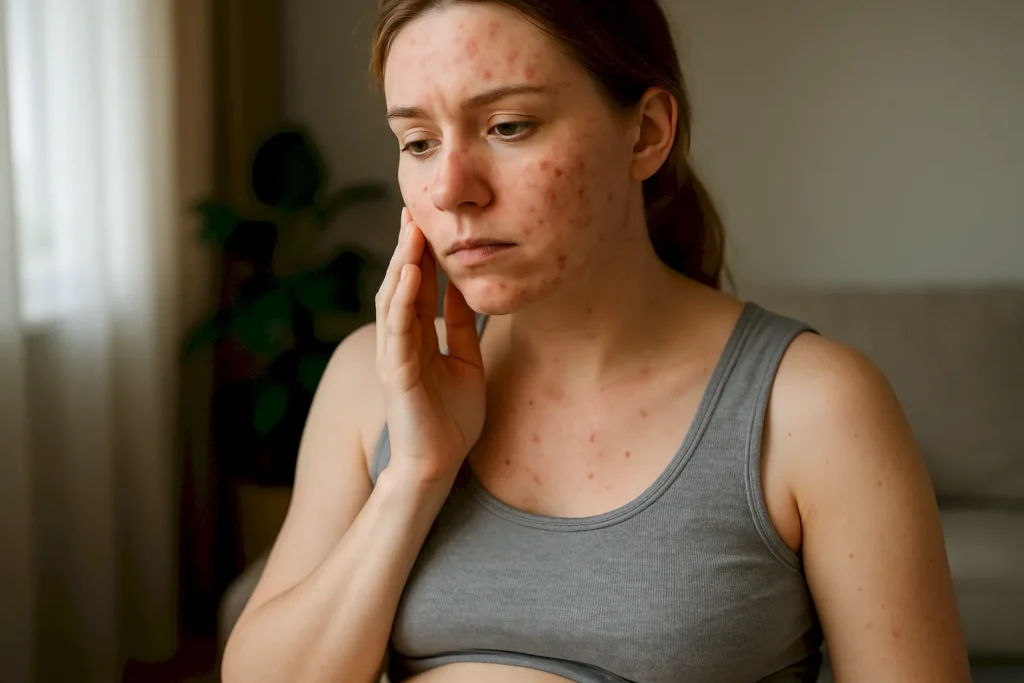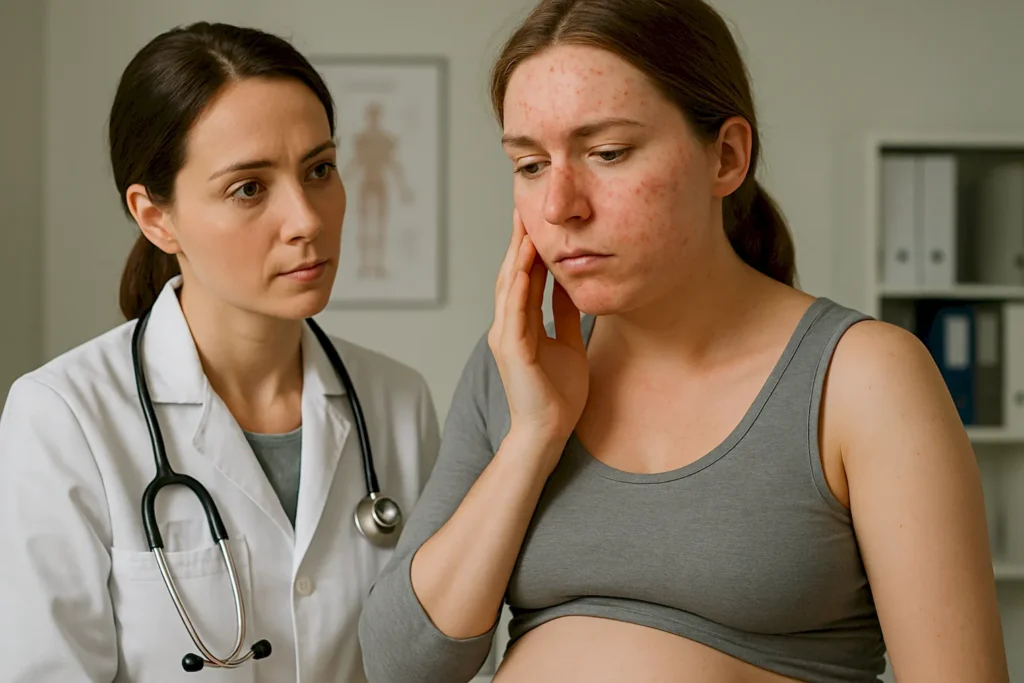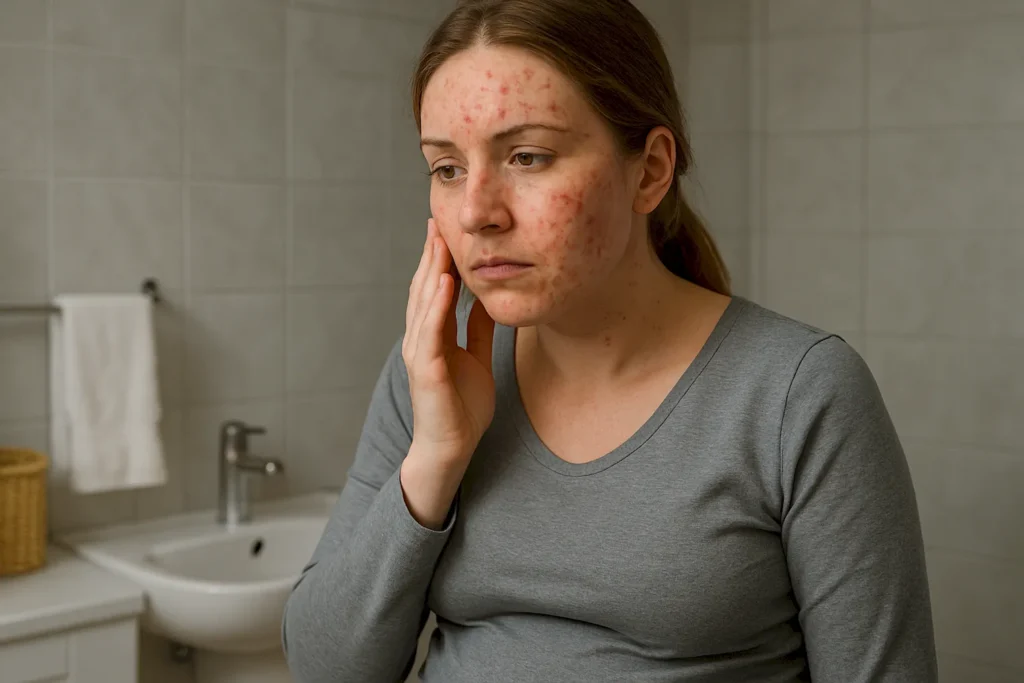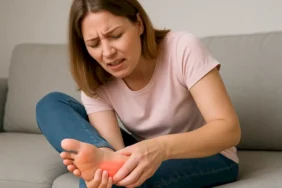Post pregnancy pimples are a common concern among new mothers, primarily caused by hormonal fluctuations during and after childbirth. These breakouts are usually temporary, lasting from a few weeks to several months depending on individual skin types and hormonal balance. Understanding the root causes and adopting natural remedies, a customized skincare routine, and supportive dietary habits can effectively reduce and prevent breakouts. In more persistent or severe cases, consulting a dermatologist may be necessary. Proper skin care and informed lifestyle adjustments play a key role in restoring and maintaining healthy skin after pregnancy.
What Causes Post Pregnancy Pimples?
Post pregnancy pimples can be a frustrating side effect for many new mothers, often causing concern during a time that should be filled with joy. Multiple factors contribute to this skin issue, and understanding them can help in prevention. The fluctuating hormone levels during and after pregnancy, combined with changes in daily routines, can significantly impact skin health. Much like pregnancy acne, these post pregnancy breakouts are driven primarily by hormonal changes.
One of the primary reasons for the emergence of post pregnancy pimples lies in hormonal changes. These hormonal fluctuations can lead to an increase in oil production, which in turn can clog pores and result in acne. As such, it is crucial to be aware of how these hormones function in the body during postpartum recovery.
Common Causes of Post Pregnancy Pimples
- Hormonal Imbalance: Sudden changes in hormone levels can trigger acne.
- Increased Oil Production: Larger amounts of sebum can clog pores.
- Skin Sensitivity: Skin may be more sensitive after pregnancy, causing breakouts.
- Stress: New responsibilities can lead to stress-induced acne.
- Diet Changes: Dietary shifts during and after pregnancy can affect skin.
- Lack of Sleep: Sleep deprivation can worsen skin conditions.
- Poor Skincare Choices: Using harsh products may irritate sensitive skin.
Additionally, skin changes play a significant role in the likelihood of developing post pregnancy pimples. After childbirth, postpartum skin may be more reactive and sensitive due to rapid adjustments. Maintaining a gentle skincare routine can help manage these changes effectively. Adopting products that cater specifically to sensitive skin types can lead to better outcomes.
Product Irritations
It’s also important to consider product irritations. Many new mothers might change their skincare regimes, potentially incorporating new cosmetics or cleansing agents. Utilizing products that are too harsh or not tailored to one’s changing skin can exacerbate acne. It is advisable to evaluate all products used and opt for non-comedogenic options that support skin health.
How Hormones Trigger Post Pregnancy Acne
Post pregnancy pimples are a common skin concern for many new mothers, largely due to the hormonal fluctuations that occur after childbirth. During pregnancy, elevated hormone levels such as progesterone and estrogen can lead to increased oil production, which often results in a radiant complexion. However, after delivery, these hormone levels drop dramatically, causing a disruption in the skin’s balance, leading to inflammation and breakouts.
Steps in Hormonal Influence on Acne
- Hormonal Fluctuation: Post delivery, hormones rapidly decline, triggering skin changes.
- Increased Oil Production: This sudden change can lead to excess sebum, clogging pores.
- Inflammation: Hormonal shifts can provoke inflammatory responses, worsening acne.
- Skin Regeneration: The skin may struggle to regenerate, resulting in the formation of pimples.
- Stress Response: New motherhood can heighten stress, exacerbating acne triggers.
- Pore Blockage: Dead skin cells and oils can accumulate, leading to post pregnancy pimples.
Additionally, postpartum hormonal changes can lead to increased sensitivity in the skin, making it more prone to irritation and breakouts. The fluctuating levels of cortisol, a hormone linked to stress, can also fuel this condition, causing the skin to react in ways that promote the development of pimples. Similarly, these hormonal shifts can cause other postpartum concerns such as hair loss after pregnancy, which is also a temporary condition linked to the body’s adjustment after childbirth.
Understanding these hormonal influences is key to managing and preventing post pregnancy acne.
As you navigate the challenges of motherhood, it’s essential to adopt mindful skincare strategies tailored to your changing skin needs. By addressing the root causes of post pregnancy pimples, such as hormonal imbalances and compromised skin barriers, you can create a more supportive environment for your skin. Recognizing that patience is essential during this transitional phase will also aid in reducing anxiety surrounding skin changes.

Are Post Pregnancy Pimples Permanent?
Understanding whether post pregnancy pimples are permanent is essential for any new mother experiencing skin changes. The truth is, while some women may find that their skin clears up after giving birth, others may continue to struggle with acne for an extended period. The key factors that influence the duration and permanence of post pregnancy pimples include hormonal changes, skin type, and overall skincare routines.
To better comprehend the permanence of these pimples, it helps to differentiate between temporary and persistent acne. Many women experience temporary breakouts due to hormonal fluctuations in the months following childbirth. However, others may develop more chronic issues. Recognizing the signs can assist in determining whether professional treatment or lifestyle adjustments are necessary.
Factors Affecting Permanence
- Hormonal Levels: Fluctuations in estrogen and progesterone can directly impact acne.
- Skin Type: Oily skin may be more prone to persistent pimples.
- Overall Health: Conditions like stress can exacerbate acne.
- Diet: Certain foods may trigger breakouts in some women.
- Skincare Routine: Inadequate cleansing can contribute to continued acne.
- Genetics: Family history may play a role in individual susceptibility to acne.
Ultimately, the permanence of post pregnancy pimples can vary significantly from one individual to another. External factors, such as lifestyle influences, can also contribute to the persistence of these skin concerns. It’s important for mothers to assess their daily habits and consider necessary adjustments that can support healthier skin during this transformative time.
Lifestyle Influences
Adopting healthy lifestyle choices can greatly impact the condition of your skin post pregnancy. Regular exercise, adequate hydration, and a balanced diet rich in vitamins and minerals can help prevent breakouts. Additionally, stress management techniques, such as yoga or meditation, may improve both mental well-being and skin health. Taking holistic care of your body not only benefits your skin but also enhances your overall postpartum experience.
Natural Remedies for Post Pregnancy Pimples
Post pregnancy pimples can be a frustrating issue for many women as their bodies adjust to hormonal shifts after childbirth. It’s essential to address these skin concerns naturally to promote healing without harsh chemicals. Several effective natural remedies can help soothe the skin and reduce breakouts, allowing new mothers to regain their confidence during this transformative time.
Effective Natural Remedies
- Aloe Vera Gel: Known for its soothing properties, aloe vera helps to reduce inflammation and heal the skin.
- Tea Tree Oil: This natural antiseptic has antibacterial properties that can prevent acne by addressing the bacteria responsible for breakouts.
- Green Tea: Rich in antioxidants, green tea can be applied topically to reduce redness and swelling associated with post pregnancy pimples.
- Honey: A natural moisturizer with antibacterial benefits, honey can help keep the skin hydrated while fighting acne-causing bacteria.
- Apple Cider Vinegar: Diluted with water, apple cider vinegar can balance skin pH and prevent outbreaks.
- Lavender Essential Oil: Known for its calming effects, lavender oil also helps in reducing skin irritation and promoting healing.
- Oatmeal Mask: A mixture of oatmeal and water can act as a gentle exfoliant, removing dead skin cells that contribute to clogged pores.
Incorporating these remedies into your skincare routine can significantly reduce the appearance of post pregnancy pimples, but consistency is key. Remember to perform a patch test before trying any new remedy to ensure it suits your skin type. Additionally, while these natural solutions can be effective, maintaining a proper skincare routine is crucial for long-term management of post pregnancy acne.
As you explore these natural remedies, it’s important to be patient and give your skin time to respond. Each individual’s skin is unique, and finding the right combination of remedies may take some experimentation.
When dealing with post pregnancy pimples, it’s vital to nourish your body from within as well. Staying hydrated, eating a balanced diet, and managing stress can all contribute to clearer skin. By combining natural remedies with a healthy lifestyle, you can enhance your overall skincare approach and effectively combat the challenges posed by post pregnancy acne.
Skincare Routine to Manage Post Pregnancy Pimples
Managing post pregnancy pimples can be easier with a dedicated skincare routine. After pregnancy, hormonal changes can cause your skin to react differently, leading to increased oil production and breakouts. It’s essential to adopt a regimen that focuses on gentle yet effective products to combat these issues while nurturing your skin.
| Skincare Product | Benefits | Frequency of Use |
|---|---|---|
| Gentle Cleanser | Removes excess oil and impurities | Twice daily |
| Exfoliant | Unclogs pores and removes dead skin cells | 2-3 times a week |
| Moisturizer | Hydrates and balances skin | Daily |
| Sunscreen | Protects against UV damage | Every morning |
To build an effective skincare routine, it’s vital to focus on three primary elements: cleansing, moisturizing, and sun protection. These components work synergistically to reduce the likelihood of post pregnancy pimples. Ensure you choose products that are specifically designed for your skin type and are free from harsh chemicals that can exacerbate sensitivity.
Cleansing
A gentle cleanser is the backbone of any effective skincare routine. Using a cleanser suited for your skin type helps remove dirt, excess oils, and makeup without stripping your skin of essential moisture. Look for products with natural ingredients that cater to sensitive skin, especially after pregnancy. Regular cleansing will help minimize breakouts by keeping your pores clear.
Moisturizing
Even if your skin tends to be oily, moisturizing is essential. Post pregnancy skin may still require hydration to maintain its balance. Choose lightweight, non-comedogenic moisturizers that provide hydration without clogging pores. This can help not only in managing post pregnancy pimples but also in improving your overall skin texture.
Daily Skincare Steps
- Wash your face with a gentle cleanser twice a day.
- Exfoliate 2-3 times a week to remove dead skin cells.
- Apply a lightweight, non-comedogenic moisturizer daily.
- Use targeted treatments for any active breakouts.
- Never skip sunscreen, applying it every morning.
- Stay hydrated by drinking plenty of water.
- Consult with a dermatologist for personalized advice if needed.
Lastly, it’s essential to never underestimate the importance of sun protection in managing post pregnancy pimples. Exposure to sunlight can worsen pigmentation and lead to other skin issues. A broad-spectrum sunscreen of at least SPF 30 should be applied daily, even on cloudy days, to shield your skin from harmful rays.

Foods That May Worsen Post Pregnancy Pimples
After childbirth, many women experience a surge in hormonal changes that can lead to post pregnancy pimples. One crucial aspect of managing this condition is understanding the impact of your diet. Certain foods can exacerbate acne by increasing inflammation or stimulating oil production in the skin. By being mindful of what you consume, you can help mitigate these unwanted skin eruptions.
| Food Category | Effect on Skin | Examples |
|---|---|---|
| Dairy Products | Can increase hormones that trigger acne | Milk, cheese, yogurt |
| Sugary Foods | Promotes inflammation and oiliness | Candies, cakes, soda |
| Processed Foods | High in unhealthy fats and sodium | Chips, fast food, frozen meals |
| Excessive Salt | Can lead to dehydration and skin issues | Processed meats, canned soups |
In addition to understanding food categories, it’s essential to pinpoint specific items that can trigger or worsen post pregnancy pimples. Acknowledging these foods can empower you to make healthier dietary choices that promote clearer skin. Below is a list to consider when planning your meals.
Foods to Avoid
- High-sugar snacks
- Refined carbohydrates
- Dairy products
- Fried foods
- Alcohol
- Highly processed foods
- Spicy dishes
By eliminating or reducing these foods from your diet, you may find significant improvements in your skin condition. It is crucial to nourish your body with wholesome foods that support skin health and mitigate the occurrence of post pregnancy pimples. Always consult your healthcare provider or a nutritionist for personalized dietary recommendations, especially during your recovery period after childbirth.
When to See a Dermatologist for Post Pregnancy Acne
After giving birth, it’s common for new mothers to experience hormonal fluctuations, which can lead to acne outbreaks, including post pregnancy pimples. While some may find that these pimples resolve on their own as hormones stabilize, others may find persistence in their skin issues. Understanding when to seek professional help becomes crucial in managing your skin health effectively. Consulting a dermatologist can provide tailored treatment options that may not be feasible with over-the-counter products alone.
Signs You Should Consult a Dermatologist
- Persistent acne that does not respond to home treatments
- Severe breakouts that cause significant discomfort or pain
- Acne that leads to scarring or hyperpigmentation
- Redness or inflammation that spreads beyond the affected areas
- Acne accompanied by other symptoms such as itching or irritation
- Recurring acne outbreaks despite following a skincare routine
- Concerns related to the safety of acne treatments while breastfeeding
Recognizing these signs can help you make informed decisions about your skincare. It’s essential to address any concerns with a qualified professional who understands the nuances of post pregnancy skin. Taking proactive steps can not only improve your skin condition but also boost your overall confidence as you navigate your new role as a parent. Controlling post pregnancy pimples early on can prevent more severe skin issues later, allowing for a more enjoyable postpartum experience.
How Long Do Post Pregnancy Pimples Last?
Post pregnancy pimples can be an unwelcome reminder of the major changes your body goes through during and after pregnancy. The duration of these breakouts varies significantly from one woman to another, with factors like hormonal shifts, skin type, and overall health playing a pivotal role. Typically, these pimples might persist for a few weeks to a few months, depending on how well your body adjusts to hormonal fluctuations and lifestyle changes.
Duration of Post Pregnancy Pimples
| Factor | Expected Duration | Comments |
|---|---|---|
| Hormonal Changes | 1-3 months | Depends on how quickly hormones stabilize |
| Skin Type | Varies | Oily skin may experience longer durations |
| Diet | 4-6 weeks | High sugar or dairy intake may extend breakouts |
| Stress Levels | 2-3 months | Chronic stress can exacerbate acne conditions |
In understanding the timeline for post pregnancy pimples, it’s crucial to address key factors that might influence their persistence. Lifestyle adjustments, skincare routines, and dietary choices can have significant effects on the healing process. Moreover, maintaining a balanced skincare regime while monitoring stress levels may also aid recovery.
Duration Factors
- Hormonal Stability: The quicker your hormones return to pre-pregnancy levels, the sooner the pimples may fade.
- Skin Type: Oily skin tends to struggle more with acne, potentially prolonging the pimple duration.
- Dietary Habits: A balanced diet can help reduce inflammation and speed up recovery.
- Stress Management: High stress can lead to increased secretion of acne-causing hormones.
- Skincare Regimen: Using the right products can effectively mitigate acne duration.
- Hydration Levels: Staying well-hydrated supports skin health and can support the healing process.
- Genetics: Family history of acne may play a role in how long breakouts last.
Understanding and managing these factors can significantly influence how long post pregnancy pimples last and improve your overall skin health during this transformative time.






